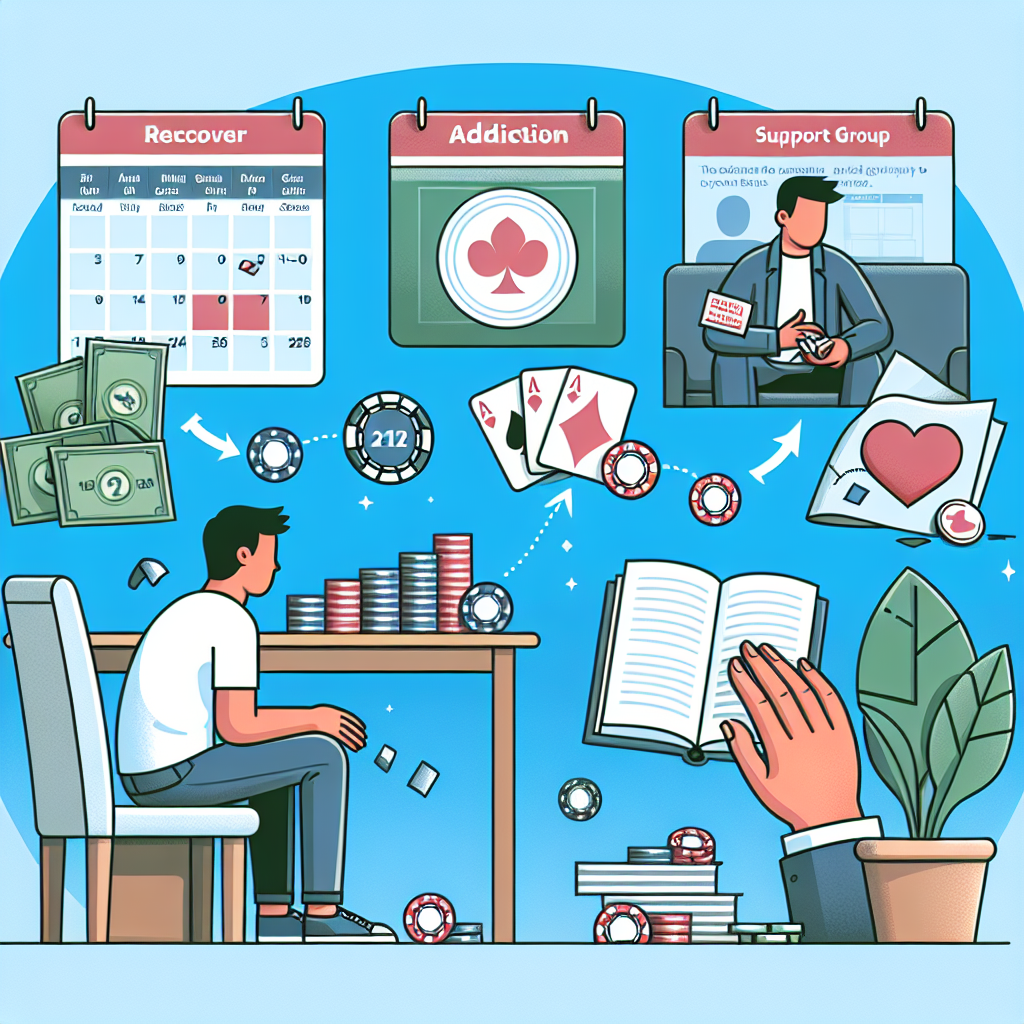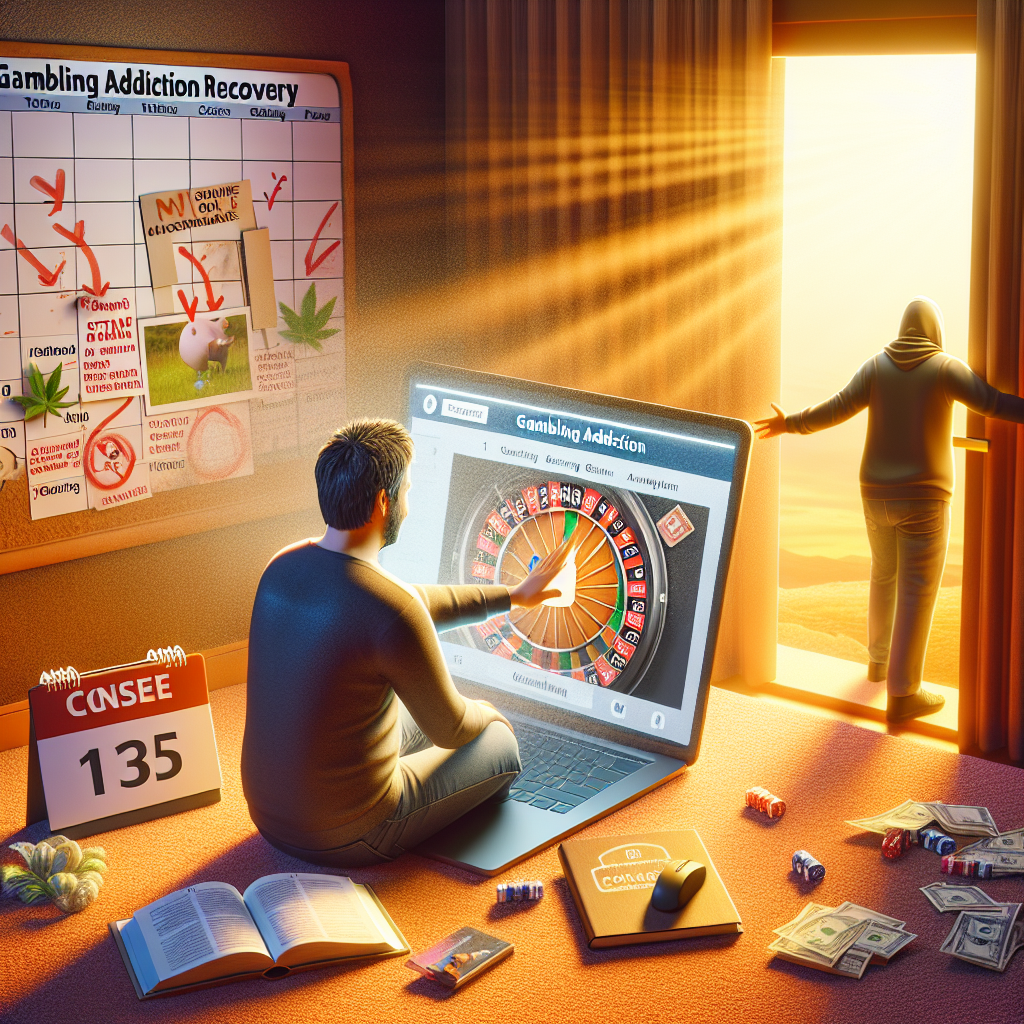-
Table of Contents

“Recognize the problem, seek support, and commit to change.”
Introduction
Gambling addiction recovery begins with the crucial step of acknowledging the problem. This involves recognizing the negative impact gambling has on one’s life and admitting the need for help. The next step is seeking professional support, which may include therapy, counseling, or joining support groups such as Gamblers Anonymous. Developing a strong support network of family and friends is also essential. Additionally, creating a plan to manage finances and avoid gambling triggers can help in maintaining long-term recovery.
Recognizing The Problem: The First Step In Gambling Addiction Recovery
Recognizing the problem is the first step in gambling addiction recovery, and it is often the most challenging yet crucial phase. The journey towards recovery begins with an honest acknowledgment of the issue at hand. Many individuals struggling with gambling addiction may find themselves in denial, unable to see the extent of their problem. This denial can be a significant barrier, preventing them from seeking the help they need. However, once the problem is recognized, the path to recovery becomes clearer and more attainable.
The initial step involves self-reflection and a willingness to confront the reality of the situation. This can be a daunting task, as it requires admitting to oneself that gambling has become more than just a pastime; it has evolved into a compulsion that is negatively impacting various aspects of life. This realization often comes after experiencing significant losses, whether financial, relational, or emotional. It is during these moments of clarity that individuals can begin to see the destructive patterns of their behavior.
Following this recognition, the next step is to seek support. This can come in many forms, including confiding in trusted friends or family members, joining support groups, or seeking professional help. Support groups, such as Gamblers Anonymous, provide a safe space for individuals to share their experiences and receive encouragement from others who have faced similar challenges. Professional counselors and therapists can offer specialized guidance and strategies to help manage the addiction.
In addition to seeking support, it is essential to educate oneself about gambling addiction. Understanding the nature of the addiction, its triggers, and its consequences can empower individuals to take control of their recovery. Knowledge is a powerful tool that can help demystify the addiction and reduce feelings of shame or guilt. By learning about the psychological and physiological aspects of gambling addiction, individuals can develop a more compassionate and informed perspective on their situation.
Another critical component of the recovery process is developing healthy coping mechanisms. Gambling often serves as an escape from stress, anxiety, or other emotional difficulties. Therefore, finding alternative ways to cope with these feelings is vital. This might include engaging in physical activities, practicing mindfulness or meditation, pursuing hobbies, or seeking social connections. By replacing gambling with positive and fulfilling activities, individuals can gradually break free from the cycle of addiction.
Setting realistic goals and creating a structured plan can also aid in the recovery process. This involves identifying specific, achievable objectives and outlining the steps needed to reach them. For instance, setting a goal to reduce gambling gradually or to abstain from gambling entirely can provide a clear direction and sense of purpose. Keeping a journal to track progress and reflect on successes and setbacks can be a valuable tool in maintaining motivation and accountability.
Lastly, it is important to practice self-compassion and patience throughout the recovery journey. Overcoming gambling addiction is not an overnight process; it requires time, effort, and perseverance. There may be moments of relapse or discouragement, but these should be viewed as opportunities for growth and learning rather than failures. By treating oneself with kindness and understanding, individuals can foster a resilient mindset that supports long-term recovery.
In conclusion, recognizing the problem is the foundational step in gambling addiction recovery. Through self-reflection, seeking support, educating oneself, developing healthy coping mechanisms, setting realistic goals, and practicing self-compassion, individuals can embark on a transformative journey towards a healthier and more fulfilling life. The path to recovery may be challenging, but with determination and the right resources, it is entirely achievable.
Seeking Professional Help: An Essential Step In Overcoming Gambling Addiction
Seeking professional help is an essential step in overcoming gambling addiction, a journey that often begins with the recognition of the problem. Acknowledging that gambling has become more than just a pastime and has started to negatively impact various aspects of life is a crucial first step. This realization can be daunting, but it is also empowering, as it opens the door to recovery and a healthier future.
Once the problem is acknowledged, the next step is to seek professional help. This can take many forms, including therapy, counseling, and support groups. Professional therapists and counselors who specialize in addiction can provide invaluable guidance and support. They can help individuals understand the underlying causes of their gambling behavior, such as emotional triggers or psychological issues, and develop strategies to cope with these triggers in healthier ways.
Therapy sessions often involve cognitive-behavioral techniques, which are designed to change the thought patterns that lead to compulsive gambling. By identifying and challenging irrational beliefs about gambling, individuals can begin to see their behavior in a new light and make more rational decisions. Additionally, therapy can help build resilience and improve emotional regulation, which are critical skills for maintaining long-term recovery.
Support groups, such as Gamblers Anonymous, offer a community of individuals who are going through similar experiences. Sharing stories and challenges with others who understand the struggle can provide a sense of solidarity and reduce feelings of isolation. These groups often follow a structured program, such as the 12-step model, which provides a clear path to recovery and emphasizes personal responsibility, spiritual growth, and mutual support.
In addition to therapy and support groups, it is important to address any co-occurring mental health issues. Many individuals with gambling addiction also struggle with conditions such as depression, anxiety, or substance abuse. Treating these issues concurrently can improve overall well-being and reduce the likelihood of relapse. Integrated treatment plans that address both gambling addiction and mental health can be particularly effective.
Another critical aspect of seeking professional help is developing a strong support network. This includes not only therapists and support groups but also family and friends. Open communication with loved ones about the challenges and progress in recovery can foster a supportive environment. Family therapy can also be beneficial, as it helps repair relationships that may have been damaged by the addiction and teaches family members how to support their loved one in recovery.
Financial counseling is another important component of professional help. Gambling addiction often leads to significant financial problems, and addressing these issues is essential for recovery. Financial counselors can assist in creating a budget, managing debt, and developing a plan to regain financial stability. This practical support can alleviate some of the stress associated with financial difficulties and allow individuals to focus more fully on their recovery.
In conclusion, seeking professional help is a multifaceted process that involves therapy, support groups, addressing co-occurring mental health issues, building a support network, and financial counseling. Each of these components plays a vital role in overcoming gambling addiction and achieving long-term recovery. While the journey may be challenging, taking these first steps can lead to a healthier, more fulfilling life. The courage to seek help and the commitment to follow through with treatment can transform lives and offer hope for a brighter future.
Q&A
1. **Question:** What is the first step in recognizing a gambling addiction?
**Answer:** The first step is acknowledging that there is a problem and understanding the negative impact gambling has on one’s life.
2. **Question:** What is a crucial initial action to take after recognizing a gambling addiction?
**Answer:** Seeking professional help, such as consulting a therapist or joining a support group like Gamblers Anonymous, is a crucial initial action.
Conclusion
The first steps in gambling addiction recovery typically involve acknowledging the problem, seeking professional help, and building a support system. Acknowledging the problem requires the individual to recognize and admit that their gambling behavior is harmful. Seeking professional help can include consulting with a therapist, counselor, or joining a specialized treatment program. Building a support system involves reaching out to family, friends, or support groups such as Gamblers Anonymous to provide emotional support and accountability. These initial steps are crucial for laying the foundation for a successful recovery journey.



